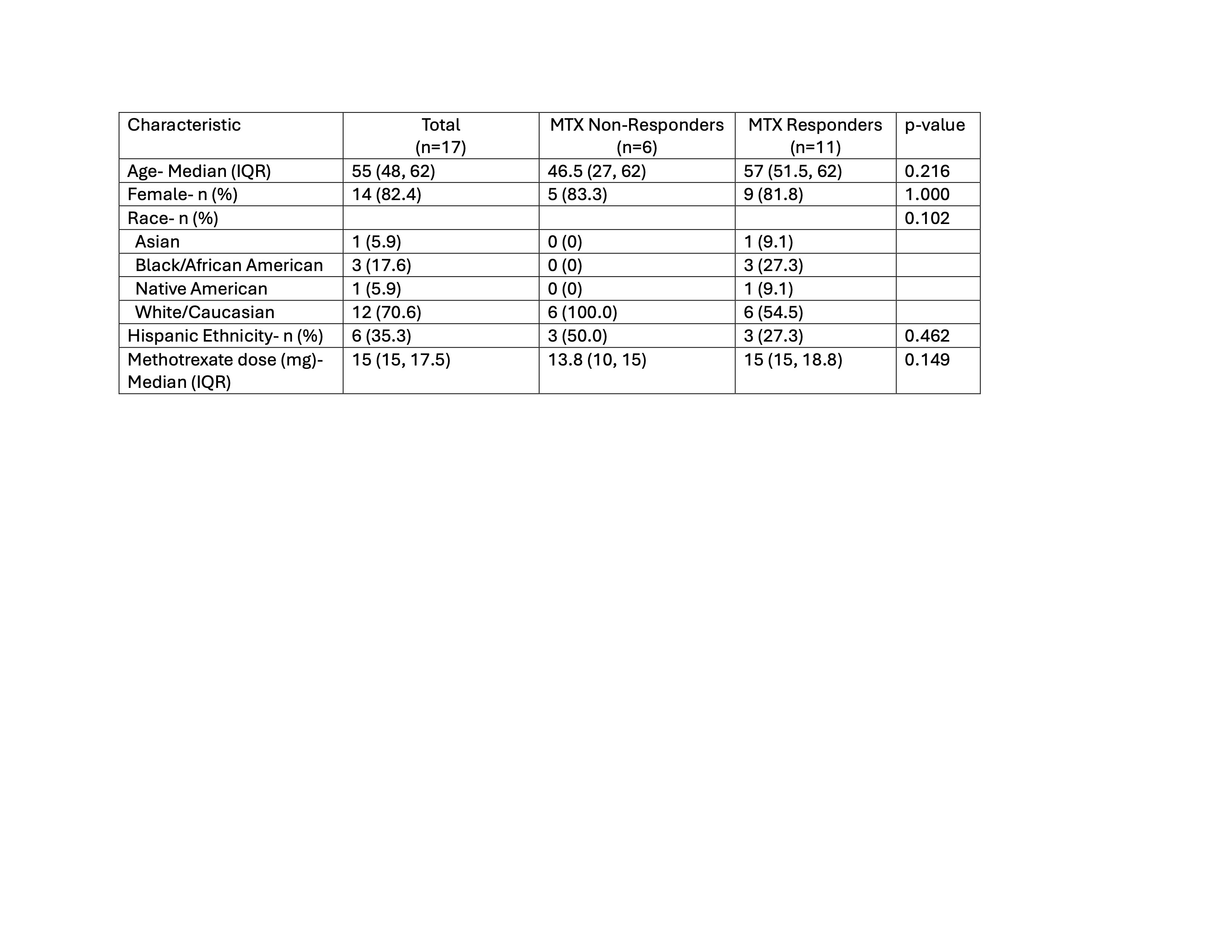Session Information
Session Type: Poster Session A
Session Time: 10:30AM-12:30PM
Background/Purpose: Diet, the gut microbiome, and gut microbial metabolites have been implicated in rheumatoid arthritis (RA) development and modulation. Seafood based-omega-3 fatty acids modulate inflammatory cytokines in RA. Fiber rich diets, such as Mediterranean and vegetarian diets, are associated with increased short chain fatty acid (SCFA)-producing bacteria. In turn, SCFAs have been shown to modulate the gut microbiome, enhance anti-inflammatory mediators in murine RA models, and be associated with decreased risk of progression to clinical RA in at-risk individuals. Until now, most studies of SCFA supplementation have been in animal models. In this proof of principle study, we aimed to address this gap by analyzing the effects of diet and butyrate supplementation in new onset RA (NORA) patients, hypothesizing that butyrate supplementation in NORA with healthier diets will improve disease activity, ultimately leading to better treatment response.
Methods: Clinical, dietary, and metabolomic data were obtained from NORA patients meeting 2010 ACR/EULAR RA criteria. Participants took methotrexate (MTX) plus butyrate (1 gm butyrate, 3 times daily) over 4 months (Table 1). MTX responders (MTX-R) were defined by either a change in DAS-28 ESR of > 1.8 from baseline and/or DAS28 < 2.6 (remission) at 4 months. Clinical data, dietary data (based on a modified NHANES Food Frequency Questionnaire), and fecal samples were collected at month 1, 2, and 4. Fecal metabolite quantification was performed by 1H NMR spectroscopy. Between group differences were analyzed using Mann Whitney U tests and Fischer’s exact tests as appropriate. Relationships between variables were calculated using Spearman’s correlations. Adherence to multiple healthy diets, including fish/seafood, Mediterranean, and vegetarian diets was assessed to examine associations between diet quality, SCFA, and disease activity.
Results: 17 patients were enrolled: 11 responders and 6 non-responders. Increase in fecal SCFA concentration correlated with improvement in DAS28 scores at 1 month (r= -0.749, p=0.001, Figure 1A). In a group of 12 patients, those with higher quality diet had an increase in fecal acetate after 4 months of butyrate supplementation, while those who had the lowest quality diet had a decrease in acetate (p=0.013, Figure 1B). Patients with high quality diets were more likely to be MTX-R (p=0.028, Figure 1C).
Conclusion: In this small, proof of principle study, we found that increased fecal SCFA concentration was associated with improvement in disease activity after only 1 month of MTX and butyrate, reinforcing the connection between SCFA and disease activity. Furthermore, only those consuming diets rich in SCFA precursors had improvement in acetate levels which may indicate that these diets are essential for butyrate supplementation to be effective. In fact, high quality diets, irrespective of SCFA changes, were associated with response. While thought provoking, larger studies are needed to explore and confirm these hypothesis-generating results.
 Table 1. Characteristics of NORA cohort taking MTX and butyrate.
Table 1. Characteristics of NORA cohort taking MTX and butyrate.
.jpg) Figure 1. Associations between disease activity, SCFA, and diet. (A) Change in fecal SCFA is negatively correlated with change in DAS28 scores after 1 month of butyrate supplementation. (B) Participants who consumed multiple foods groups containing fish/omega-3, mediterranean, or vegetarian diets had increased change in fecal acetate after 4 months of MTX and butyrate supplementation when compared to those who did not consume these diets (C) MTX responders were more likely to report consumption of diets rich in fish, omega-3, legumes, whole grains, vegetables, and/or fruits compared to non-responders.
Figure 1. Associations between disease activity, SCFA, and diet. (A) Change in fecal SCFA is negatively correlated with change in DAS28 scores after 1 month of butyrate supplementation. (B) Participants who consumed multiple foods groups containing fish/omega-3, mediterranean, or vegetarian diets had increased change in fecal acetate after 4 months of MTX and butyrate supplementation when compared to those who did not consume these diets (C) MTX responders were more likely to report consumption of diets rich in fish, omega-3, legumes, whole grains, vegetables, and/or fruits compared to non-responders.
To cite this abstract in AMA style:
French K, Alvarado L, Haberman R, Blank R. Association of Short Chain Fatty Acids and Diet with Disease Activity and Methotrexate Response in New Onset Rheumatoid Arthritis: A Proof of Principle Study [abstract]. Arthritis Rheumatol. 2025; 77 (suppl 9). https://acrabstracts.org/abstract/association-of-short-chain-fatty-acids-and-diet-with-disease-activity-and-methotrexate-response-in-new-onset-rheumatoid-arthritis-a-proof-of-principle-study/. Accessed .« Back to ACR Convergence 2025
ACR Meeting Abstracts - https://acrabstracts.org/abstract/association-of-short-chain-fatty-acids-and-diet-with-disease-activity-and-methotrexate-response-in-new-onset-rheumatoid-arthritis-a-proof-of-principle-study/
